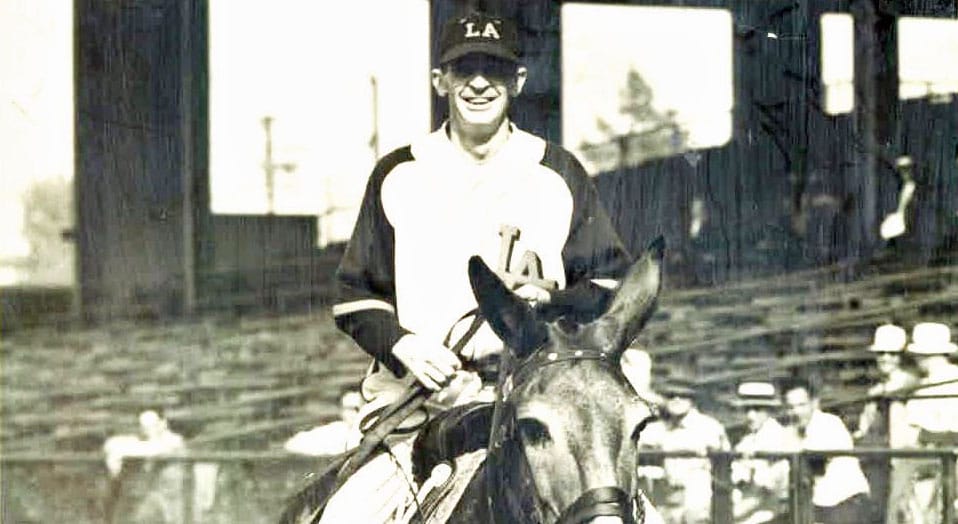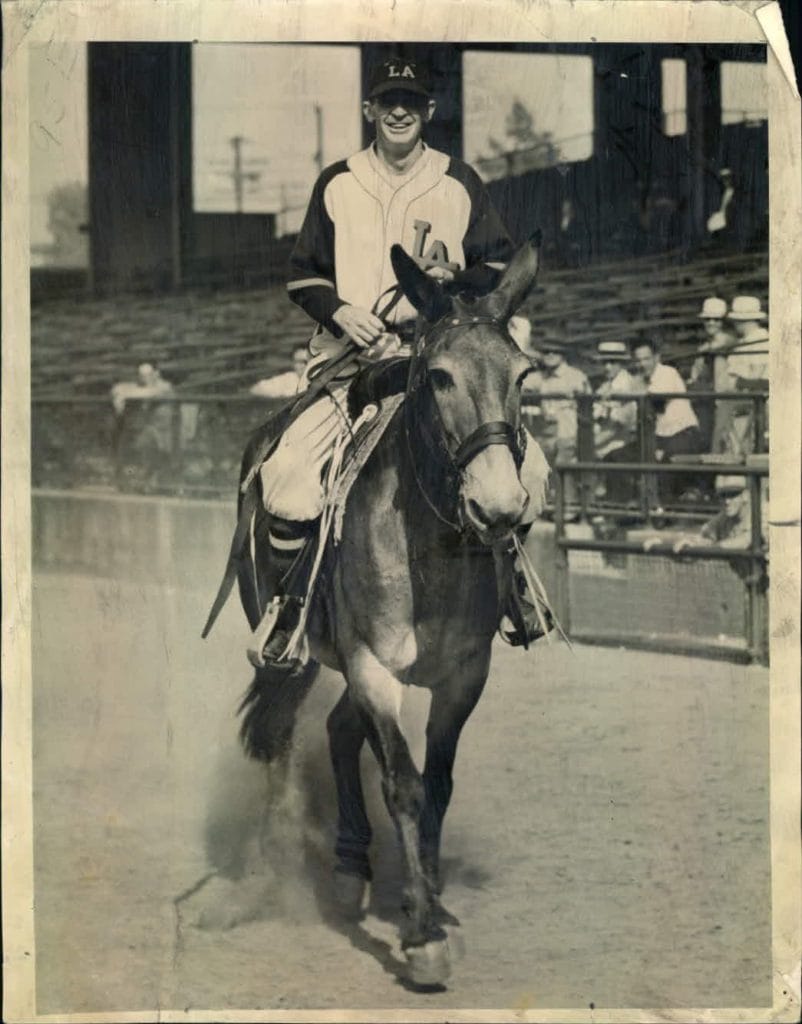

Uh oh...
It appears that you're using a severely outdated version of Safari on Windows. Many features won't work correctly, and functionality can't be guaranteed. Please try viewing this website in Edge, Mozilla, Chrome, or another modern browser. Sorry for any inconvenience this may have caused!
Read More about this safari issue.

On Sunday, September 6, 1942, at Pittsburgh’s Forbes Field, the Cubs and Pirates played a game that meant nothing. The Pirates were headed for fifth place in the National League standings, and the Cubs would finish one spot lower. America was embroiled in a war overseas and many major leaguers were already in the military. Teams were getting desperate for pitching. So much so, that on that day Cubs’ manager, Jimmie Wilson, decided to take a look at the unusual rookie the Cubs had added a few days earlier. Behind 3 – 0 and going nowhere in the standings, perhaps he was more curious than hopeful about this strange-looking fellow in his bullpen.
They called him Jittery Joe, and his appearance did not exactly strike fear in opposing hitters. The rookie pitcher was maybe 5’ 9” and on a good day weighed about 135 lbs. His uniform hung from a wiry frame like a child in an adult’s shirt, and his county stride walking to the mound was almost comical. Jittery Joe had been dominating for Tulsa in the Texas League in the 1942 season, but it took considerable imagination and some apathy for a major league team to give him a shot. Incidentally, Jittery Joe was 37 years old, and he had pitched more than 3,000 innings over 16 seasons to earn this chance.

Jonas Arthur Berry was born in December 1904, at Huntsville, Arkansas, deep in the Ozarks. He was the eighth of nine children who grew up on War Eagle Creek, in Madison County. His father Jonas “Joan” Berry was a part-time farmer and occasional Sheriff of Madison County, having been elected to three terms over a forty-year period.
Known locally as Joe, Berry was a semi-pro pitcher of some notoriety in the Ozarks, when he got a chance to give professional baseball a try. He made his pro debut in 1927 pitching in Mississippi for teams in the Class D Cotton States League. He would remain with various franchises in the CSL for six seasons and post 85 victories during his stay in the virtual obscurity of baseball’s lowest minor leagues.

Berry was 28 years old before he advanced to Joplin in the Class C Western Association in 1933. He was the second oldest player on the Joplin team, which was not a good sign for a pitcher on the way up.
After three successful years in the Western Association, Berry got the promotion that changed his life in the winter of 1935, when the Cubs optioned him to Los Angeles Angels of the prestigious Pacific Coast League. Big city newspapers covered PCL games daily, and sportswriters soon started searching for adjectives to describe the Angels’ unlikely-looking pitcher from the Ozark Mountains.
Always painfully slow-working, Berry became even more deliberate as his success began to depend more on deception than speed. He stepped off the mound, rubbed down the ball, tugged at his oversized uniform, and shook off the sign. Making the hitter wait was an effective new weapon. The term jittery seemed to fit him well, and by September most sports page stories about Joe Berry used his new moniker, “Jittery Joe.” Other new adjectives were also attached to Berry in the PCL. Many of these descriptions like “sensational” and “outstanding” had seldom been used to describe relief pitching before.

In 1942, despite six good years in Los Angeles, the Cubs moved 37-year-old Berry down to Tulsa, a Class A team in the Texas League, where he had another outstanding season. With hundreds of major league pitchers called to active duty, the Cubs were now so desperate for pitching help that in September Jittery Joe Berry got the call to the major leagues.
The game Jittery Joe had looked forward to for 17 years did not go well. After a routine first out, Berry gave up a double, a triple, two singles, and a walk. When the Pirates finally went down in the inning, Berry had faced eight batters, allowed five to reach base, and given up two runs. A week later he gave up two more runs in an inning’s work. He did not look like a major league pitcher, and he had not done anything to dispel that image.
The Cubs saw nothing of value in Jittery Joe and released him after the season. He was nearing his 40th birthday, but there was no quit in Joe Berry. Back in the minors with Milwaukee, he won 18 games in 1943. Berry looked good enough to Philadelphia Manager Connie Mack to get another shot at the majors. Perhaps the old Philly boss was desperate for pitching or perhaps he had a different perspective on age since he had just turned 81.
The 1944 Athletics finished a distant fifth, but Joe Berry was the best relief pitcher in the American League. He was second in the league in pitching appearances and the league leader in games finished and saves. Although finishing games and carrying the designation of “closer” had not gained the prestige of that role in today’s game, Joe Berry was an overnight star in Philadelphia.
In 1945, Berry picked up right where he left off in 1944. He led the league in games pitched and games finished. Despite the addition of a promising rookie third baseman from Swifton, Arkansas, named George Kell, the A’s were a hapless last-place club, with only one pitcher with more wins than losses, Jittery Joe Berry.
Jittery Joe’s size, age, and everyman appearance made him a Philadelphia hero and a national phenomenon. America needed “feel good” stories, and it was easy to enjoy the success of a 40-year-old hillbilly humbling the big guys up in Philly. Jittery Joe thrived on an assortment of deceptive slow stuff. Along with a screwball and an assortment of curves, some say he threw an occasional illegal spitball. If indeed he threw the spitter, he used the phantom spitball much more often. Along with his jittery antics, Berry would appear to go to his mouth, then to the ball, in an attempt to convince the hitter the spitball was coming. After those obvious tip-offs, it never did.
Berry had one more year in the majors in 1946, but with the regulars back from the war there was no place in the majors for 41-year-old Jittery Joe. He would continue to pitch in the minors for five more summers. He worked in more than 130 games after his major league career ended and his ERA for those seasons was a very respectable 2.93. He retired after the 1951 season at the age of 46.

A look at Jittery Joe Berry’s career gains some perspective in relation to 25 years of baseball’s legendary stars. When Berry broke into baseball in 1927, Babe Ruth was in the process of hitting 60 home runs for the legendary “murderers row” Yankee lineup that also included a 24-year-old kid named Gehrig, who drove in 173 runs. Mickey Mantle, Willie Mays, and Hank Aaron had not been born.
Berry pitched against Bill Dickey, Joe DiMaggio and Ted Williams. He was almost twice the age of fellow Arkansan George Kell when they were teammates in 1944. He witnessed history from 60 feet away, pitching to Jackie Robinson in Canada in 1946, and when Berry retired in 1951, Mantle and Mays were rookies taking New York by storm. Ruth and Gehrig were deceased.
Jittery Joe Berry pitched in 936 games in 24 summers of professional baseball. He played on teams in 20 cities and towns across the United States from Laurel, Mississippi, to Los Angeles California, and he has the rare distinction of having played pro baseball in four decades from the 1920s to the 1950s. Jonas Berry lost his life in a traffic accident in Anaheim, California, on September 27, 1958, at age 54. He is buried in Huntsville, Arkansas, under a gravestone inscribed “Jittery Joe Berry.”
We do the work.
You check your email.
Sign up for our weekly e-news.
Get stories sent straight to your inbox!










Like this story? Read more from Jim Yeager
In 1942, the Americans Tom Brokaw would later celebrate as our...
In 1920, the winter days between Christmas and New Year’s Day promised...
The 1951 baseball season arrived in Little Rock with little cause for...
Join the Conversation
Leave a Comment